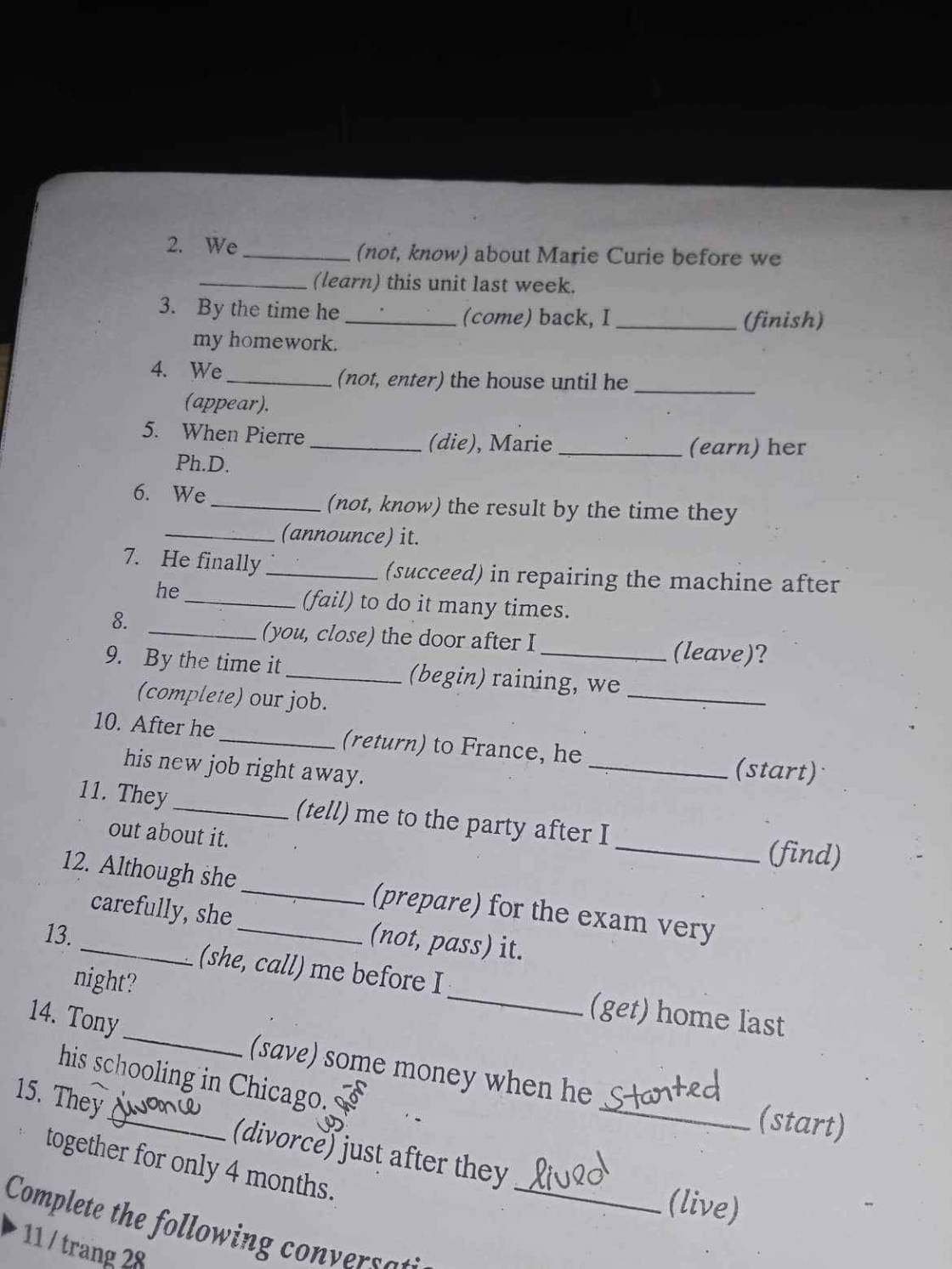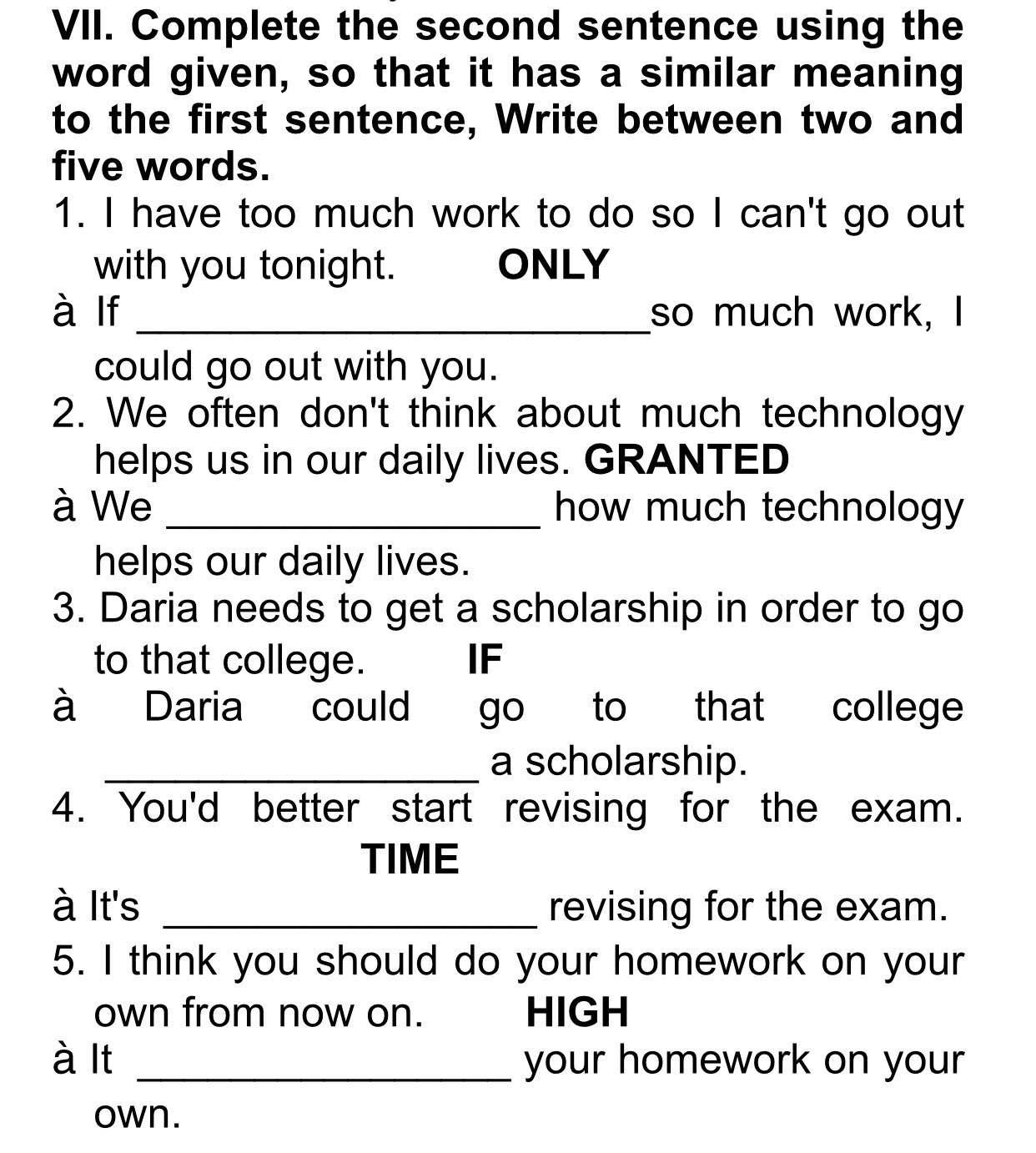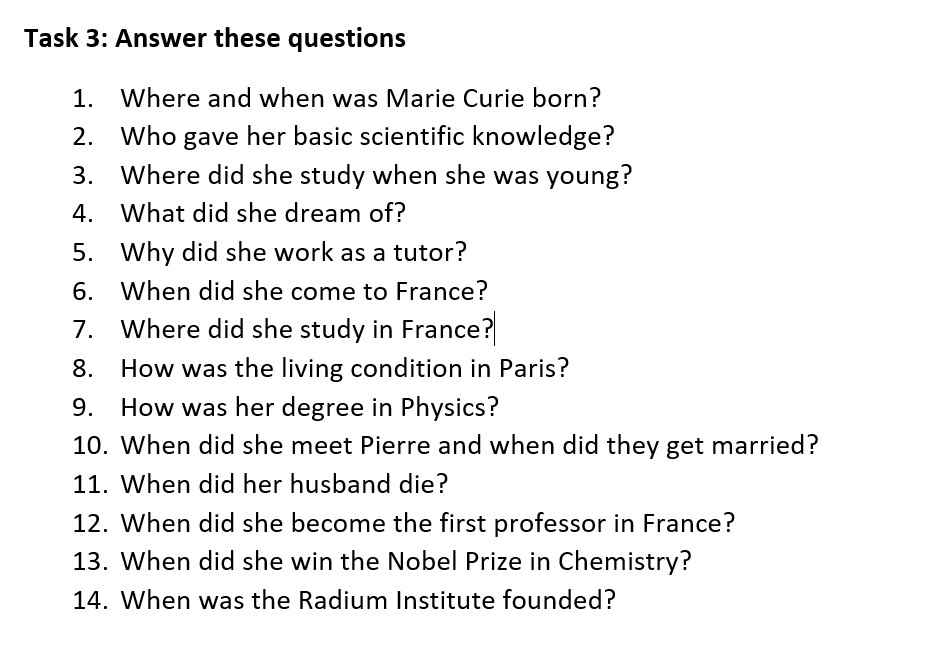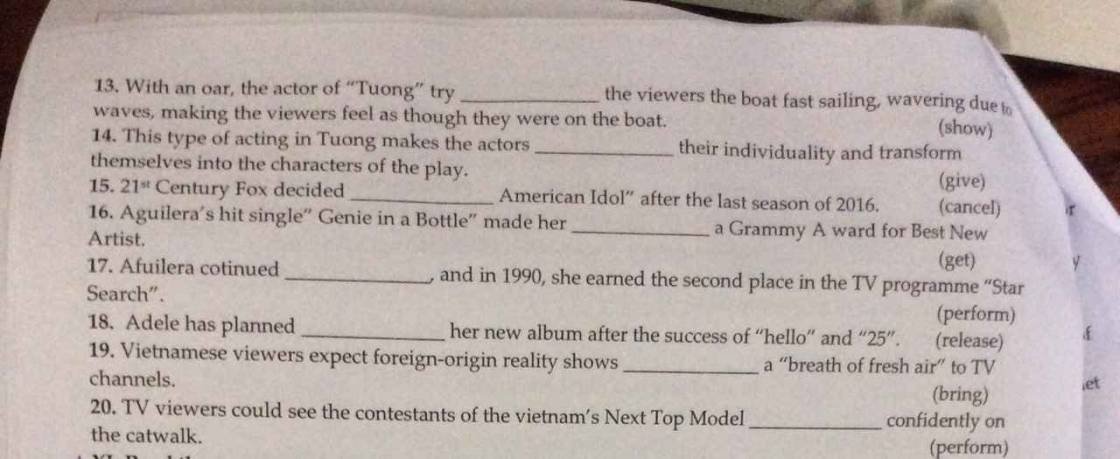
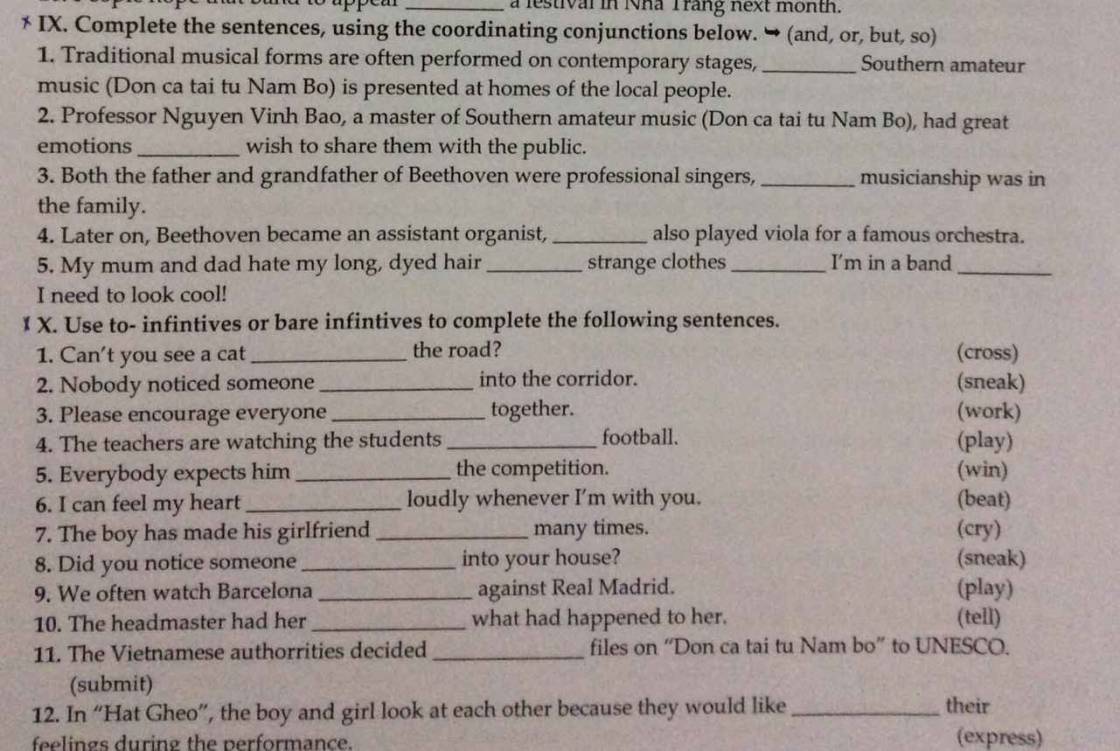
Unit 3: PEOPLE’S BACKGROUND
Complete the sentences, using the coordinating conjunctions below (and, or, but, so )
1. Traditional musical forms are often performed on contemporary stages, but Southern amasteur music ( Don ca tai tu Nam Bo ) is presented at homes of the local people
2. Professor Nguyen Vinh Bao, a master of Southern amateur music ( Don ca tai tu Nam Bo ), had great emotions and wish to share them with the public
3. Both the father and grandfather of Beethoven were professional singers, so musicianship was in the family
4. Later on, Beethoven became an assistant orgenist and also played viola for a famous orchestra.
5. My mum and dad hate my long, dyed hair and strange clothes but I'm in a band so I need to look cool !
Use to - infintives or bare infintives to complete the following sentences
1. Can't you see a cat crossing the road ? ( cross )
2. Nobody noticed someone sneak into the corridor ( sneak )
3. Please encourage everyone to work together ( work )
4. The teachers are watching the students play football (play)
5. Everybody expects him to win the competition (win)
6. I can feel my heart beating loudly whenever I'm with you (beat)
7. They boy has made his girlfriend cry many times (cry)
8. Did you notice someone sneak into your house ? (sneak)
9. We often watch Barcelona play against Real Madrid (play)
10. The headmaster had her tell what had happened to her (tell)
11. The Vietnamese authorrities decided to submit files on " DOn ca tai tu Nam Bo " to UNESCO. (submit)
12. In " Hat Gheo ", the boy and girl look at each other because they would like to express their feelings during the performance (express)
Đúng 2
Bình luận (0)
Giúp vs mọi người ơ
VI. Read the following passage & choose the best answerLaptop computers are popular all over the world. People use them on trains and airplanes, in airports and hotels. These laptops connect people to their workplace. In the United States today, laptops also connect students to their classroom.Westlake College in Virginia will start a laptop computer program that allows students to do schoolwork anywhere they want. Within five years, each of the 1500 students at the college will receive a laptop...
Đọc tiếp
VI. Read the following passage & choose the best answer
Laptop computers are popular all over the world. People use them on trains and airplanes, in airports and hotels. These laptops connect people to their workplace. In the United States today, laptops also connect students to their classroom.
Westlake College in Virginia will start a laptop computer program that allows students to do schoolwork anywhere they want. Within five years, each of the 1500 students at the college will receive a laptop. The laptops are part of a $10 million computer program at Westlake, a 100-year-old college. The students with laptops will also have access to the Internet. In addition, they will be able to use email to "speak" with their teachers, their classmates, and their families. However, the most important 'part of the laptop program is that students will be able to use computers without going to computer labs. They can work with it at home, in a fast food restaurant or under the trees- anywhere at all!
Because of many changes in computer technology, laptop use in higher education, such as colleges and universities, is workable. As laptops become more powerful, they become more similar to desktop computers. In addition, the portable computers can connect students to not only the Internet, but also libraries and other resources. State higher education officials are studying how laptops can help students. State officials are also testing laptop programs at-other universities, too.
At Westlake College, more than 60 percent of the staff use computers. The laptops will allow all teachers to use computers in their lessons. As one Westlake teacher said, "Here we are in the middle of Virginia and we're giving students a window on the world. They can see everything and do everything."
1. The main purpose of the laptop program is to give each student a laptop to
A. use for their schoolwork B. access the Internet
C. work at home D. connect them to libraries
2. Why is the word" speak" in the second paragraph in quotation marks?
A. They don't really talk. B. They use the computer language.
C. Laptops have speakers. D. None of the above reasons is correct.
3. Which of the following is true about Westlake College?
A. All teachers use computers.
B. 1500 students have laptops.
C. It is an old college in America.
D. Students there can do everything.
4. A window on the world in the last paragraph means that students can_____.
A. attend lectures on information technology.
B. travel around the world
C. get information from around the world
D. have free laptops
5. What can we infer from the program?
A. The program is successful B. The program is not workable
C. The program is too expensive D. We don't know the result yet.
VI. Read the following passage & choose the best answer
Laptop computers are popular all over the world. People use them on trains and airplanes, in airports and hotels. These laptops connect people to their workplace. In the United States today, laptops also connect students to their classroom.
Westlake College in Virginia will start a laptop computer program that allows students to do schoolwork anywhere they want. Within five years, each of the 1500 students at the college will receive a laptop. The laptops are part of a $10 million computer program at Westlake, a 100-year-old college. The students with laptops will also have access to the Internet. In addition, they will be able to use email to "speak" with their teachers, their classmates, and their families. However, the most important 'part of the laptop program is that students will be able to use computers without going to computer labs. They can work with it at home, in a fast food restaurant or under the trees- anywhere at all!
Because of many changes in computer technology, laptop use in higher education, such as colleges and universities, is workable. As laptops become more powerful, they become more similar to desktop computers. In addition, the portable computers can connect students to not only the Internet, but also libraries and other resources. State higher education officials are studying how laptops can help students. State officials are also testing laptop programs at-other universities, too.
At Westlake College, more than 60 percent of the staff use computers. The laptops will allow all teachers to use computers in their lessons. As one Westlake teacher said, "Here we are in the middle of Virginia and we're giving students a window on the world. They can see everything and do everything."
1. The main purpose of the laptop program is to give each student a laptop to
A. use for their schoolwork B. access the Internet
C. work at home D. connect them to libraries
2. Why is the word" speak" in the second paragraph in quotation marks?
A. They don't really talk. B. They use the computer language.
C. Laptops have speakers. D. None of the above reasons is correct.
3. Which of the following is true about Westlake College?
A. All teachers use computers.
B. 1500 students have laptops.
C. It is an old college in America.
D. Students there can do everything.
4. A window on the world in the last paragraph means that students can_____.
A. attend lectures on information technology.
B. travel around the world
C. get information from around the world
D. have free laptops
5. What can we infer from the program?
A. The program is successful B. The program is not workable
C. The program is too expensive D. We don't know the result yet.
Đúng 0
Bình luận (1)
LEARNING HOW TO LEARNThere. is usually one important (1)_____ missing from most school (2) _____. Very few students are (3) _____how to organize their learning, and how to (4) _____the best use of their time. Lets take some simple (5) _____Do you know how to (6) _____up words in a dictionary, and do you understand all the (7) _____ the dictionary contains? Can you (8) notes quickly, and can you understand them (9) _____ ? For some reason, many schools give learners .no (10) _____ with these matt...
Đọc tiếp
LEARNING HOW TO LEARN
There. is usually one important (1)_____ missing from most school (2) _____. Very few students are (3) _____how to organize their learning, and how to (4) _____the best use of their time. Let's take some simple (5) _____Do you know how to (6) _____up words in a dictionary, and do you understand all the (7) _____ the dictionary contains? Can you (8) notes quickly, and can you understand them (9) _____ ? For some reason, many schools give learners .no (10) _____ with these matters. Teachers ask students to (11) _____ pages from books, or tell them to write ten pages, but don't explain (12)_____ to do it. Learning by (13) _____ can be useful, but it is important to have genuine (14) _____of a subject. You can (15) _____a lot of time memorizing books, without understanding anything about the subject!
1. A. theme B. book C. subject D. mark
2. A. agendas B. timetables C. terms D. organizations
3. A. taught B. learnt C. educated D. graduated
4. A. take B. give C. get D. make
5. A. sentences B. results C. rules D. examples
6. A. find B. look C. research D. get
7. A. information B. advise C. subjects D. themes
8. A. do B. send C. make D. revise
9. A. after B. afterwards C. lastly D. at last
10. A. teaching B. ability C. instruction D. help
11. A. concentrate B. remind C. forget D. memorise
12. A. how B. what C. why D. it
13. A. the way B. heart C. now D. law
14. A. information B. success C. understanding D. attention
15. A. pass B. waste C. tell D. use
LEARNING HOW TO LEARN
There. is usually one important (1)_____ missing from most school (2) _____. Very few students are (3) _____how to organize their learning, and how to (4) _____the best use of their time. Let's take some simple (5) _____Do you know how to (6) _____up words in a dictionary, and do you understand all the (7) _____ the dictionary contains? Can you (8) notes quickly, and can you understand them (9) _____ ? For some reason, many schools give learners .no (10) _____ with these matters. Teachers ask students to (11) _____ pages from books, or tell them to write ten pages, but don't explain (12)_____ to do it. Learning by (13) _____ can be useful, but it is important to have genuine (14) _____of a subject. You can (15) _____a lot of time memorizing books, without understanding anything about the subject!
1. A. theme B. book C. subject D. mark
2. A. agendas B. timetables C. terms D. organizations
3. A. taught B. learnt C. educated D. graduated
4. A. take B. give C. get D. make
5. A. sentences B. results C. rules D. examples
6. A. find B. look C. research D. get
7. A. information B. advise C. subjects D. themes
8. A. do B. send C. make D. revise
9. A. after B. afterwards C. lastly D. at last
10. A. teaching B. ability C. instruction D. help
11. A. concentrate B. remind C. forget D. memorise
12. A. how B. what C. why D. it
13. A. the way B. heart C. now D. law
14. A. information B. success C. understanding D. attention
15. A. pass B. waste C. tell D. use
Đúng 1
Bình luận (0)
IV. Use the word given in Capitals to form a word that fits in the space in the same line. There is an example at the beginning (0). AN EMAIL FANI think the computer is such a (0) useful (USE) invention. Take email, for example. Its such an easy and (1) __________ (PAIN)way to write letters, when I was younger, I rarely ever put pen to paper, not even to say thank you for presents sent by (2) __________ (THOUGHT) relatives. They must have thought I was so (3) __________ (GRATITUDE). Now, though,...
Đọc tiếp
IV. Use the word given in Capitals to form a word that fits in the space in the same line. There is an example at the beginning (0). AN EMAIL FAN
I think the computer is such a (0) useful (USE) invention. Take email, for example. It's such an easy and (1) __________ (PAIN)way to write letters, when I was younger, I rarely ever put pen to paper, not even to say "thank you" for presents sent by (2) __________ (THOUGHT) relatives. They must have thought I was so (3) __________ (GRATITUDE). Now, though, you can't keep me away from the keyboard. I can (4) __________ (CHEER) spend hours typing away on my computer, all types of messages to all types of people.
One of the worst (5) ___________ (ADVANTAGE) for me of writing by hand was always the (6) ___________ (EMBARRASS) of knowing that people would be able to see and criticize my untidy handwriting and (7)__________ (CARE) spelling. Now, of course, thanks to the spellcheck, I can edit what I've written quickly and (8) __________ (EFFORT) before I send it off. I just can't get over how (9) __________ (WONDER) fast everything is. Teenagers nowadays take all this for granted, but when I was their age, none of this existed. Young people do not realize how (10) __________ (FORTUNE) they are.
0.useful
1. unpainful
2. thoughtful
3. grateful
4. cheerfully
5. disadvantages
6. embarrassment
7. careless
8. effortlessly
9. wonderfully
10. fortunately
Đúng 1
Bình luận (0)
1. If only I didn’t have so much work, I could go out with you.
2. We often take it for granted how much technology helps our daily lives.
3. Daria could go to that college if she got a scholarship.
4. It’s time you started revising for the exam.
5. It is high time you did your homework on your own.
Đúng 0
Bình luận (0)
tính từ của physically
Mn giúp em với an, mai em cần gấp
. I worked as a ______tutor to earn money for a summer trip.
a. general
b. private
c. secret
d. single
12. What a ____girl! Nothing can stop her from realizing her decisions.
a. strong-willed
b. good
c. powerful
d. mature
13. Mary ______the dream of becoming an actress as she was a child.
a. liked
b. received
c. fed
d. harbored
14. She was so ___that it took her only a short time to learn her lessons.
a. ambitious
b. romantic
c. intellig...
Đọc tiếp
Mn giúp em với an, mai em cần gấp . I worked as a ______tutor to earn money for a summer trip. a. general b. private c. secret d. single 12. What a ____girl! Nothing can stop her from realizing her decisions. a. strong-willed b. good c. powerful d. mature 13. Mary ______the dream of becoming an actress as she was a child. a. liked b. received c. fed d. harbored 14. She was so ___that it took her only a short time to learn her lessons. a. ambitious b. romantic c. intelligent d. quick 15. Marie Curie was born ____November 7th , 1867. (in/at/on/from) 16. Marie Curie was the first woman professor _____the Sorbonne. a. in b. at c. of d. on 17. In spite of her difficult living conditions, she worked very _____. a. hard b. hardly c. harder d. hardest 18. She ____ a degree in Physics and another in Mathematics. a. made b. did c. took d. put 19. We must do something. We can’t go on living like that. The Opposite meaning of “go on” is: a. stopped b. determined c. continued d. harbored 20. Computer models help to determine whether a particular area is likely to flood. The Closest meaning of “determine” is: a. make up b. find out c. take over d. put up 21. He behaved like an adult. I think he is more ____than other boys in his class. a. intelligent b. mature c. ambitious d. developed 22. In 1903, Marie became the first woman _____ a Doctor of Science degree. a. receive b. to received c. receives d. to receive 23. The employees were made _____the computer evening class by the manager. a. attending b. attend c. to attend d. attended 24. Marie Curie _____ a Nobel Prize in Chemistry in 1911. a. awarded b. was awarded c. had awarded d. awards 25. What is your surname?The Closest meaning of “surname” is: a. first name b. second name c. nickname d. family name 26. Could you please stop ____so much noise? a. taking b. doing c. making d. spending 27. When you finish ____the report, would you mind ____me your computer? a. to write/to lend b. writing/lending c. write/lend d. written/lend 28. When they met again, they ____each other for 5 years. a. haven’t seen b. didn’t see c. hadn’t seen d. had seen 29. Shakespeare _____Hamlet at the end of the sixteenth century. a. writes b. wrote c. had written d. was writing 30. Marie Curie ____the Radium Institute in 1914. a. found b. founded c. organized d. set off 31. Marie Curie harbored the dream of a __career which was impossible for a woman then a. science b. scientific c. scientist d. scientifically 32. I suddenly remembered I _____my wallet on the bus. a. leave b. had left c. have left d. would leave 33. ____Ali went to sleep, he had called his family. a. Before b. After c. As soon as d. While 34. When she …………., the match ……………… a. had arrived / had already started b. had arrived / already started c. arrived / had already started d. arrived / already started 35. By the age of 34, my brother ………… his own business. A. started B. has started C. had started D. would start
I worked as a ______tutor to earn money for a summer trip. a. general b. private c. secret d. single
12. What a ____girl! Nothing can stop her from realizing her decisions. a. strong-willed b. good c. powerful d. mature
13. Mary ______the dream of becoming an actress as she was a child. a. liked b. received c. fed d. harbored
14. She was so ___that it took her only a short time to learn her lessons. a. ambitious b. romantic c. intelligent d. quick
15. Marie Curie was born ____November 7th , 1867. (in/at/on/from)
16. Marie Curie was the first woman professor _____the Sorbonne. a. in b. at c. of d. on
17. In spite of her difficult living conditions, she worked very _____. a. hard b. hardly c. harder d. hardest
18. She ____ a degree in Physics and another in Mathematics. a. made b. did c. took d. put
19. We must do something. We can’t go on living like that. The Opposite meaning of “go on” is: a. stopped b. determined c. continued d. harbored
20. Computer models help to determine whether a particular area is likely to flood. The Closest meaning of “determine” is: a. make up b. find out c. take over d. put up
21. He behaved like an adult. I think he is more ____than other boys in his class. a. intelligent b. mature c. ambitious d. developed
Đúng 1
Bình luận (2)
22. In 1903, Marie became the first woman _____ a Doctor of Science degree. a. receive b. to received c. receives d. to receive
23. The employees were made _____the computer evening class by the manager. a. attending b. attend c. to attend d. attended
24. Marie Curie _____ a Nobel Prize in Chemistry in 1911. a. awarded b. was awarded c. had awarded d. awards
25. What is your surname? The Closest meaning of “surname” is: a. first name b. second name c. nickname d. family name
26. Could you please stop ____so much noise? a. taking b. doing c. making d. spending
27. When you finish ____the report, would you mind ____me your computer? a. to write/to lend b. writing/lending c. write/lend d. written/lend
28. When they met again, they ____each other for 5 years. a. haven’t seen b. didn’t see c. hadn’t seen d. had seen
29. Shakespeare _____Hamlet at the end of the sixteenth century. a. writes b. wrote c. had written d. was writing
30. Marie Curie ____the Radium Institute in 1914. a. found b. founded c. organized d. set off
Đúng 1
Bình luận (0)
31. Marie Curie harbored the dream of a __career which was impossible for a woman then a. science b. scientific c. scientist d. scientifically
32. I suddenly remembered I _____my wallet on the bus. a. leave b. had left c. have left d. would leave
33. ____Ali went to sleep, he had called his family. a. Before b. After c. As soon as d. While
34. When she …………., the match ……………… a. had arrived / had already started b. had arrived / already started c. arrived / had already started d. arrived / already started
35. By the age of 34, my brother ………… his own business. A. started B. has started C. had started D. would start
Đúng 1
Bình luận (0)


